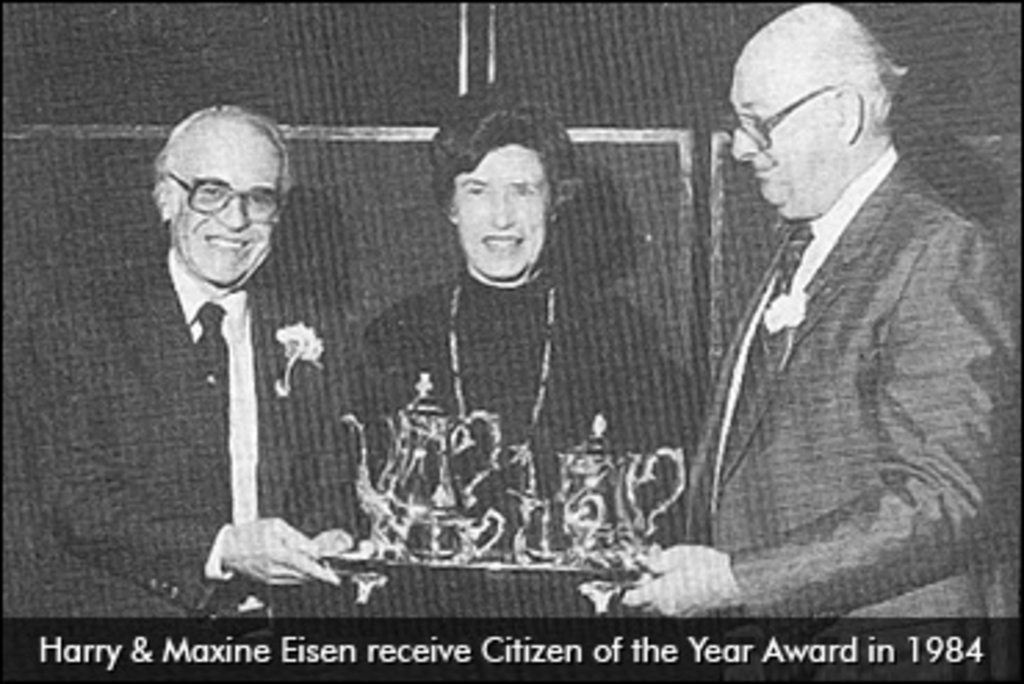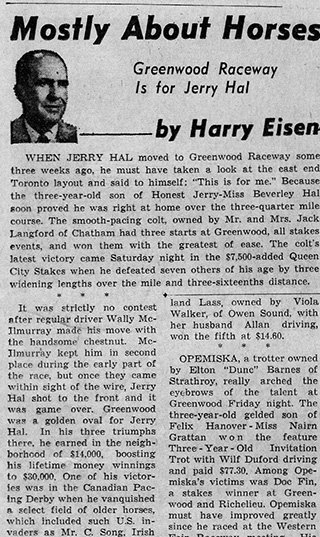SC Rewind: Remembering Harry

 In this week's edition of Rewind Robert Smith recalls the long and interesting reporting career of the late Harry Eisen. This journalistic icon is part of the 2015 inductees to the Canadian Horse Racing Hall of Fame in August.
In this week's edition of Rewind Robert Smith recalls the long and interesting reporting career of the late Harry Eisen. This journalistic icon is part of the 2015 inductees to the Canadian Horse Racing Hall of Fame in August.
For many years the name Harry Eisen was a household word for harness racing enthusiasts across Ontario and beyond. With the mere mention of this man's name, a great deal has already been written. He brought the real 'news' of the sport and much of what happened behind the scenes to people's homes as he wrote his now famous columns in the London Free Press for well over 20 years. Later this year he will take his rightful place in the Horse Racing Hall of Fame, joining those previously inducted in the Communicator category.
We once lived in a simpler less complicated world than we know today; everything wasn't instant. People waited for news and enjoyed it in its own good time. There was an old saying that "bad news travels fast." Well by today's standards, pretty much all news travelled slowly back then. What happened today, especially if it took place some distance away, was reported the next day at the earliest. While phone calls were made sparingly, the most popular medium was a newspaper. We relied on good and accurate reporting and no one was any better at it than Harry Eisen.
He first experienced his love of horses when his family lived in the small town of Palmerston, located in Wellington County. His home was near the local fairgrounds and his father had a couple of horses but not of the racing variety and Harry often groomed them. When the family moved to Toronto he gravitated to Dufferin Park where he sold tip sheets even though he had to play hooky from school to do so.
In the mid 1930's, a then very young Eisen entered the work world and through a family connection he landed a newspaper-related job at the Toronto Star. In the years that followed he moved around and wherever a better job was available he accepted it and worked his way up the ladder. In 1944 he made his final move which took him to London and the fabled Free Press, which was already nearly 100 years old. Along the way in his spare time he was a pretty accomplished amateur athlete in several sports and even donned the gloves and entered the boxing ring.
Eisen's career as a true harness horse journalist really blossomed when London's Western Fair track ushered in night racing in May of 1961. It was from here that he found his niche and for the next 22 years honed his skills as a writer and communicator concentrating solely on the harness sport. His trademark column entitled "Mostly About Horses" appeared in the Free Press each week and over time its reading became a must for everyone in the business. Prior to this his involvement had been more with thoroughbreds but he soon made the transition.


Readers not only read his columns, they talked about them and frequently kept them. They were clipped from the paper, sometimes pinned on the fridge and ultimately many made their way to the pages of a family's scrapbook. Today yellowed by time, many remain as mementos of the past when the written word was 'king'. The question may linger forever as to whether Harry was made for the job, or if the job was made for him?
Not all racing journalists could personally identify with the perils and pitfalls of horse ownership but Harry could. While his involvement as a bill paying owner was quite short-lived, it provided a good and rather humorous story worth reporting despite a somewhat desultory conclusion.
Around 1970 Harry was in attendance at a Christmas party hosted by Londoner Jack Byers and he stated that a couple of guys "ganged up on me and made me buy an interest in a horse for $250." The 'prized' horse was an 11-year-old gelding named Squire Yates. The other owners were Jack Byers, Bob Drennan and Dale Dufty, who served as trainer. He reluctantly agreed to join the partnership and ended up giving his share as a Christmas present to his wife.
The rest of the story went quickly and sadly downhill and the quarter share in the horse was given back to trainer Dufty. In a 1984 story in Trot Magazine, Eisen summed up his short ownership by saying the following. "The day he was to qualify I went out to watch him and he didn't make it. Coming to the wire he was knocking his knees so bad it sounded like Xavier Cougat's rhythm section."
After that he lost track of him. "I never had the money to get another and if I could have I would have loved to own one. "
He also had another tie to harness racing and its duration while also short was worth noting as well. He had a horse named after him -- Eisen -- which was bred and owned by Dunc and Eileen Barnes of Strathroy. "He was a big, strong good looking horse...very much along the lines of his namesake," Harry quipped. But leg problems resulted in a very short career. "I was at Windsor to see him win his only race and he beat out Jack Byer's horse so I did get even with him for selling me that bum Squire Yates!"
Harry was not a journalistic giant in the usual sense of the word. His writings would not leave a reader in awe of his vast vocabulary nor did you have to look for hidden meanings or cryptic messages. I don't think his articles even at their best reduced too many people to tears or transported them to another 'world'. No, Harry at times could be downright predictable and perhaps even a bit boring but everybody loved his missives. Over time he developed his own unpretentious style that suited his calling in life to a tee. His level of detail and dedication to minutia made it all so interesting. Harry was what I would call quietly colourful.

Harry is shown in the London winner's enclosure where he frequently made trophy presentations.
While his main job involved interviewing, chatting, visiting or whatever word best suited the encounter to gather information, Harry usually had a further motive. He was never adverse to hearing about a "sure thing" or perhaps someone who was pretty sure they could win a race. While he was proud of his newspaper picks and the success rate he had, Harry admitted he wasn't always as lucky with his own personal wagers.
He reported what he saw and felt and undoubtedly as most reporters do, he had his short list of 'favourites'. Londoner Joe Carr, who spent a lifetime of dividing his time between racing horses and teaching school, was a frequent topic for Harry. He seldom let a chance go by to mention the teacher/horseman connection. To this day among Joe's prized possessions is a bulky scrapbook with a lot of Harry's columns and other write ups authored by the man sometimes referred to as "Harry The Horse."
In 1983 Harry retired from his long time 'day job' with the London Free Press. While his daily routine would change, his love of horses and horse racing certainly continued. He was still a regular visitor at London's Western Fair and other area tracks plus he continued to write his usual interesting features for The Canadian Sportsman, Trot Magazine and for whoever wanted a good story. He and his wife Maxine were honoured by numerous groups and organizations and they were presented with various gifts to commemorate his service to the sport.

Harry is joined by noted London horseman Dave Wall. In 1980 Harry was installed as a member of the prestigious Wall of Fame at Western Fair.
In August of 1987 I had my only opportunity to meet Mr. Eisen in person. On that occasion he was among a dozen or so pioneering individuals being honoured at Dresden Raceway. It was a memorable evening and one enjoyed by everyone. Although he was different from the other honourees in that he was the only non-trainer or driver, he was every bit as important to the sport. I was told by a third party that he was amazed that someone so young as I would be involved in preserving the sport's history and being in attendance at such things. I guess time changes everything.
There is a kind of corny old saying that a farmer is defined as a "man out standing in his field." Well Harry Eisen was definitely not a farmer but he certainly was a man outstanding in his field. His memory now lives on in the hearts of those who knew him and perhaps more importantly in all that he wrote. His columns, his folksy observations and his caring for everyone in the sport continue as his legacy.


Harry was a consumate
Harry was a consumate gentleman.